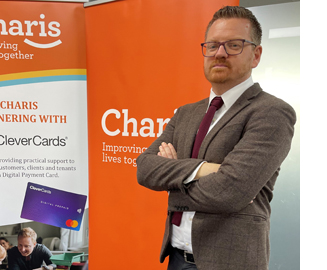 Ollie Gray, business development director, Charis
Ollie Gray, business development director, Charis
Mainstream media has been buzzing these last few weeks with stories about households being forced onto prepayment meters because they have been unable to pay their bills. British Gas has come under particular fire due to employing bailiffs who have allegedly used threatening behaviour to enter people’s properties and install prepaid meters.
This has generated a lot of negative reactions - and understandably so. People are being expected to find sometimes hundreds more pounds a month from incomes that have not increased in line with inflation, to cover household bills and everyday shopping essentials, the costs of which are spiralling out of control.
In response, the government is asking energy companies to stop this forced installation. At the time of writing, EDF has led this charge, with many more following its lead.
An increasing poverty trap
Thousands more families are falling into the fuel poverty trap, and despite falling gas prices, these reductions are not going to be passed on for some months (if not years) to come. Householders that would otherwise be too proud to ask for help, and ensure they have the means one way or another to pay their bills, are increasingly desperate as their outgoings far outweigh their incomes. Even the most severe of energy-saving measures are not keeping their energy bills to a reasonable level.
While these struggles are being felt by ordinary working families for the length and breadth of the country, it is, as ever, the most vulnerable in society who are experiencing the worst of the after-effects of the energy price increases. Every day, stories are popping up in the media about old, sick and defenceless individuals who are found sitting in dark, cold homes because they have neither the strength, support, nor the necessary information to seek the help and support that is out there.

A more targeted approach is required
Government help is currently universal, but more targeted approach needs to be implemented to ensure that those most in need receive greater support. The current system of penalising the less fortunate is not fit for purpose.
While Ofgem has strict guidelines around the use and forced installation of prepayment meters, the application of those regulations is open to interpretation. The concerning stories of the last few weeks underscore the growing debate in the hardship funding sector about the need for a dedicated social tariff for energy for those who are identified as particularly vulnerable. Immediately this would curtail one of the worst practices of the prepayment meter - that they actually run at the highest tariff on the market, so effectively, those who are struggling the most are being punished with the highest prices. Neither do they offer the facility to spread payments across the year, as direct debit customers can.
While it is acknowledged that a small number of people choose to pay through a prepayment meter as it can give them a greater sense of control over their budgeting, on the whole the benefits of a prepayment meter is at best counterintuitive, and at worst an assault on people’s freedom.
A uniform social tariff, set across all energy companies, subsidised by the energy companies, government and higher paying customers, could be an ideal safety net for those who are at the most risk. This would be a UK-wide tariff that all companies must adhere to, regardless of their own commercial tariffs, and regulated by Ofgem. As a stable economy of scale, the administration of a social tariff voucher or digital payment card through platforms such as the Charis Shop would prove far more cost-effective than monitoring and pursuing dozens of different energy companies.

Pre-payment is causing more harm than good
While the ethos behind the installation of prepayment meters is founded on ‘helping’ a client by not allowing them to get deeper into debt, the practice has, over the years, become mired in controversy. Energy companies are encouraged by Ofgem to identify and follow up on those households that are obviously struggling with their bills, offering them support and pathways out of their growing debt. Installation of a prepayment meter is a last resort step and certainly should not be implemented forcibly and with threatening behaviour.
The sector can no longer turn a blind eye to this issue. According to the Citizens Advice Bureau, 3.2 million households were forced onto pre-payment meters in 2022, after being cut off from their supply due to an inability to cover their monthly direct debits. Imagine that - 3.2 million people plunged into the cold and dark.
Now, imagine who is living in each of these households. Maybe some are old and widowed, living on their own with no family to turn to. Maybe others have health issues and require electricity to keep life-saving medication fresh and equipment powered. Maybe some have young children who, cold and hungry, are shivering in their beds night after night because they don’t have enough food in the house for them to grow and develop into healthy adults.
As a collective, we can draw up the necessary parameters for a social energy tariff - parameters that can be integrated into the Charis Shop platform to ensure that only those who are most at risk can be identified and supported and the risk of fraudulent claims is eliminated.
The most vulnerable in our society should not be paying the highest prices to be able to power their homes, and the energy sector can do so much more to help.
Charis will be exhibiting at the Procurement Reform Exhibition in Manchester on Tuesday, 14th March. Organised in partnership with the Cabinet Office, Procurement Reform will bring together key decision-makers from across the public sector. Charis welcomes visitors to come and speak with them on stand number 19.
- Log in to post comments














